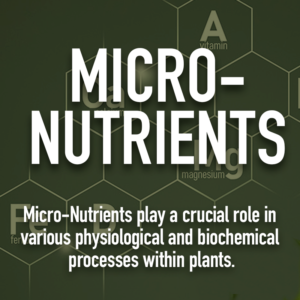The Importance of Micro-Nutrients
 Micronutrients are essential elements that plants need in relatively small quantities for proper growth, development, and overall health. These nutrients play a crucial role in various physiological and biochemical processes within plants. While plants require macronutrients like nitrogen, phosphorus, and potassium in larger amounts, micronutrients are equally important for maintaining their vitality, even though they are needed in much smaller quantities. The primary micronutrients required by plants are:
Micronutrients are essential elements that plants need in relatively small quantities for proper growth, development, and overall health. These nutrients play a crucial role in various physiological and biochemical processes within plants. While plants require macronutrients like nitrogen, phosphorus, and potassium in larger amounts, micronutrients are equally important for maintaining their vitality, even though they are needed in much smaller quantities. The primary micronutrients required by plants are:
- Iron (Fe): Iron is essential for the synthesis of chlorophyll, the pigment responsible for photosynthesis. It’s also involved in electron transport within cells, enzyme activation, and energy transfer.
- Manganese (Mn): Manganese is required for photosynthesis, enzyme activation (particularly those involved in the breakdown of carbohydrates and nitrogen metabolism), and the formation of chloroplasts.
- Zinc (Zn): Zinc plays a role in the synthesis of growth hormones, enzyme activation, and the formation of chlorophyll. It’s also involved in the development of lateral shoots and roots.
- Copper (Cu): Copper is necessary for electron transport within cells, lignin synthesis, and enzyme activation in various metabolic reactions.
- Boron (B): Boron is involved in cell wall formation, pollen germination, and the transport of sugars and other nutrients within the plant.
- Molybdenum (Mo): Molybdenum is crucial for nitrogen metabolism, as it’s a component of enzymes involved in converting nitrate to ammonia within plants.
- Chlorine (Cl): While not considered a micronutrient for all plants, chlorine is required by some plants for photosynthesis and maintaining proper ion balance within cells.
The benefits of micronutrients to plants include:
- Enzyme Activation: Micronutrients serve as cofactors for various enzymes that are essential for different metabolic processes within plants. Enzymes are biological catalysts that accelerate chemical reactions, facilitating the conversion of substrates into products.
- Photosynthesis: Micronutrients are vital for the synthesis of chlorophyll, which is the pigment responsible for capturing light energy during photosynthesis. Without sufficient chlorophyll production, plants would not be able to convert light energy into chemical energy (glucose) effectively.
- Nutrient Uptake and Transport: Some micronutrients play a role in the uptake and transport of other nutrients within the plant. For example, iron is involved in the transport of electrons during cellular respiration and photosynthesis.
- Cell Wall Formation: Micronutrients like boron are necessary for the synthesis of cell walls, which provide structural support and protection to plant cells.
- Reproduction: Micronutrients are essential for processes related to plant reproduction, such as pollen germination, seed development, and fruit formation.
- Disease Resistance: Proper levels of micronutrients can enhance a plant’s resistance to various diseases and pests by promoting healthy cell growth and strengthening plant tissues.
- Overall Plant Health: Micronutrients contribute to the overall health and vigor of plants. A deficiency or imbalance of micronutrients can lead to various symptoms such as yellowing leaves, stunted growth, and reduced yield.


